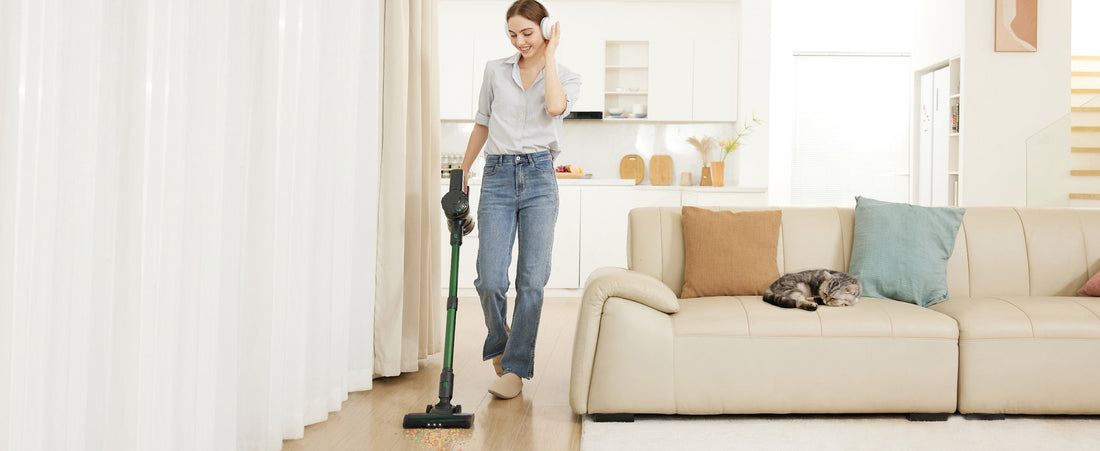Many of us have wondered why vacuum cleaners need to be so loud. The good news? They don't have to be. Let's explore how to find a vacuum that cleans effectively without sounding like a construction site.
Understanding Vacuum Noise: What Those Decibels Really Mean
The Decibel Scale Demystified
Think of decibels (dB) like temperatures for sound. Just as you know the difference between a chilly 5°C and a comfortable 20°C, understanding decibel levels helps you choose a vacuum that won't disrupt your home's peace.
-
65-75 dB: Typical vacuum cleaner - like standing next to a busy road
-
60-65 dB: Conversation level - you can talk over it without shouting
-
55-60 dB: Background music - comfortable for most people
-
Below 55 dB: Library quiet - perfect for apartments and sleeping babies
Why Some Vacuums Are Naturally Quieter
It's not magic - it's engineering. Quieter vacuums typically feature:
-
Sound-dampening materials that absorb vibration
-
Efficient motors that don't need to scream to work hard
-
Better airflow design that reduces turbulent noise
-
Quality components that don't rattle or vibrate excessively
Finding Your Perfect Quiet Vacuum Match
For Apartment Dwellers: The Considerate Cleaner
If you share walls with neighbors, you need a vacuum that won't have them knocking on your door. Look for:
-
Below 65 dB noise level
-
Efficient cleaning to get done faster
-
Low vibration that won't travel through floors
-
Cordless models that are generally quieter than corded ones
For Parents: The Naptime Ninja
When baby finally sleeps, you want to keep it that way. The ideal baby-friendly vacuum:
-
Operates below 60 dB - quiet enough for light sleepers
-
Has quick clean features for speedy mess management
-
Offers flexible scheduling for cleaning during awake hours
-
Includes HEPA filtration to capture allergens and dust
For Pet Owners: The Stress-Free Solution
Pets have sensitive ears and often fear loud noises. A pet-friendly quiet vacuum should:
-
Start quietly without sudden loud noises
-
Maintain consistent noise levels during operation
-
Have tangle-free brushes for quiet pet hair removal
-
Feature easy emptying to minimize stressful cleanup noise
Features That Make a Difference in Daily Use
Motor Technology Matters
Modern brushless motors tend to be quieter and more efficient than older brushed motors. They're like the electric cars of the vacuum world - powerful but quiet.
Design Elements That Reduce Noise
Look for vacuums with:
-
Insulated motor compartments that contain sound
-
Rubberized components that reduce vibration
-
Smooth airflow paths that minimize turbulent noise
-
Quality construction that prevents rattling and shaking
Practical Considerations Beyond Noise
Remember that the quietest vacuum isn't always the best choice if it doesn't actually clean well. The perfect balance includes:
-
Adequate suction power for your flooring types
-
Reasonable runtime for your home size
-
Practical attachments for your specific needs
-
Easy maintenance that doesn't create new headaches
Real-World Testing: What Quiet Actually Feels Like
We've tested numerous models in actual home environments, and here's what we've learned:
Under 60 dB: You can comfortably have a conversation while vacuuming. Perfect for when you need to keep an ear on the baby monitor or don't want to miss your favorite podcast.
60-65 dB: Noticeable but not overwhelming. You might raise your voice slightly to be heard, but it won't disturb neighbors in well-insulated apartments.
Above 65 dB: The traditional vacuum experience. You'll probably want to wait until everyone's out of the house or wear headphones.
The Vactidy Difference: Quiet Cleaning That Actually Works
At Vactidy, we understand that a peaceful home matters as much as a clean one. That's why we've engineered our Vactidy Blitz V12 Cordless Vacuum Cleaner (marketed as Vexilar V12 in certain international markets) to deliver powerful cleaning without the noise pollution.
With noise levels optimized for comfortable home use, the Blitz V12/Vexilar V12 proves you don't need to choose between effective cleaning and household peace. Its 48 kPa suction power handles everything from daily dust to unexpected messes, while operating at volumes that won't disrupt your household routine.
The 50-minute battery life means you can clean your entire home in one quiet session, and the high-precision filtration system ensures that while the vacuum is quiet, its cleaning performance certainly isn't.
Whether you know it as the Blitz V12 or Vexilar V12 depending on your market, this model delivers the same quiet reliability that has made it a favorite among noise-conscious cleaners worldwide.
Making Your Decision: What Really Matters
When choosing your quiet vacuum, consider:
-
Your specific living situation - apartments have different needs than detached homes
-
Your household schedule - when do you typically clean?
-
Your sensitivity to noise - everyone's tolerance is different
-
Your cleaning needs - don't sacrifice performance for silence
The best vacuum isn't necessarily the absolute quietest one - it's the one that offers the right balance of quiet operation and effective cleaning for your specific situation.
Remember: a slightly louder vacuum that actually gets used is better than a silent one that gathers dust in the closet. The goal is finding something that makes cleaning easier, not more complicated.
Here's to cleaner floors and more peaceful cleaning sessions!

